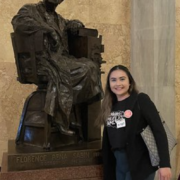Child Labor Coalition lauds Wage and Hour’s Child Labor Enforcement Strategies that includes creating a fund for victims and use of “hot goods” provisions
March 27, 2024
Media contact: National Consumers League – Reid Maki, reidm@nclnet.org, (202) 207-2820
Washington, DC – The Child Labor Coalition (CLC), representing 37 groups engaged in the fight against domestic and global child labor, expresses support for the innovative enforcement strategies in this week’s enforcement action by the Wage and Hour Division of the U.S. Department of Labor (DOL). The action, announced March 25th, involved fines of $296,951 for a Tennessee parts manufacturer, Tuff Torq, and required the company to set aside $1.5 million as “disgorgement” of 30 days’ profit related to the company’s use of child labor. Disgorgement is a legal term for remedy requiring a party that profits from illegal activity to give up any profits that result from that activity.
Tuff Torq, which makes components for outdoor, power-equipment brands such as John Deere, Toro, and Yamaha, illegally employed 10 children, including a 14-year-old, for work that was hazardous—an identified task involved permitting a child to operate a power-driven-hoisting apparatus, which is a prohibited occupational task.
The Department employed several new or recent strategies in the case, including employing the Fair Labor Standards Act’s “hot goods” provision, which was used to stop the shipment of goods made with oppressive child labor.
“The use of the ‘hot goods’ enforcement tool is also an important new strategy, which Wage and Hour announced it would use last year,” said Reid Maki, director of Child Labor Advocacy for the National Consumers League (NCL) and the CLC. “It’s another critical tool in DOL’s arsenal. Once companies realize that the shipment of goods has been stopped, they feel an immediate impact of the violation.”
“This is the first use of victim’s fund that we have noticed in a child labor enforcement action,” added Maki. “Teens employed in factory settings are often unaccompanied minors and typically very impoverished. When enforcement agents find teens working illegally, they are dismissed with no resources to survive, move forward, and reassemble their lives. A victim’s fund is something the CLC and the Campaign to End US Child Labor – the CLC is a founding member – has touted as desperately needed.”
A third innovation involves how DOL calculates child labor fines. DOL recently announced it planned to change formulas for calculating fines, which previously had been capped at $15,000 per child involved in violations at a specific work site. The new strategy involves applying the maximum fines for each violation, not limited to the number of children involved.
“It’s clear they have used the new formula in the Tuff Torq fines,” said Maki. “Fines levels came in at an average of $30,000 per child—almost double what we would have seen under the old formula. With Congress unable, at this point, to pass into law any of several bills that would increase fines by a factor of ten, DOL’s creativity here is most welcome. Fines must be raised to inflict some real pain on corporate perpetrators. We’re not where we want to be yet, but it’s good to inch closer.”
“Wage and Hour also deserves praise for directing its enforcement action at Tuff Torq,” noted Maki. “In the past, corporations that benefited from child labor have often not been held accountable, as they blamed staffing agencies for illegal hires. Holding beneficiaries accountable is something DOL said it would do when it announced its meatpacking investigation results in February 2023—it’s great to see it happening.”
The Wage and Hour Division faces a big challenge in that its inspectorate, estimated at below 750 inspectors, is too small for a country the size of the U.S. The CLC has called for a doubling of the inspectorate over the next five years and is working to help increase congressional appropriations for that purpose.
Wage and Hour has noted a sharp increase in child labor in recent years, having found 5,792 minors working in violation of child labor laws. The Economic Policy Institute indicates the increase in violations is 300 percent since 2015.
“We are especially troubled by the prevalence of children in hazardous work,” said CLC Chair Sally Greenberg, who is also the CEO of the National Consumers League. “Far too many children are working illegally in meatpacking, auto supply factories, and other hazardous work sites. The U.S. can and must do more to protect these vulnerable children.”
###
About the National Consumers League (NCL)
The National Consumers League, founded in 1899, is America’s pioneer consumer organization. Our mission is to protect and promote social and economic justice for consumers and workers in the United States and abroad. For more information, visit nclnet.org.


 By Health Policy Intern Grace Lassila
By Health Policy Intern Grace Lassila
 By Child Labor Coalition Intern Jacqueline Aguilar
By Child Labor Coalition Intern Jacqueline Aguilar










